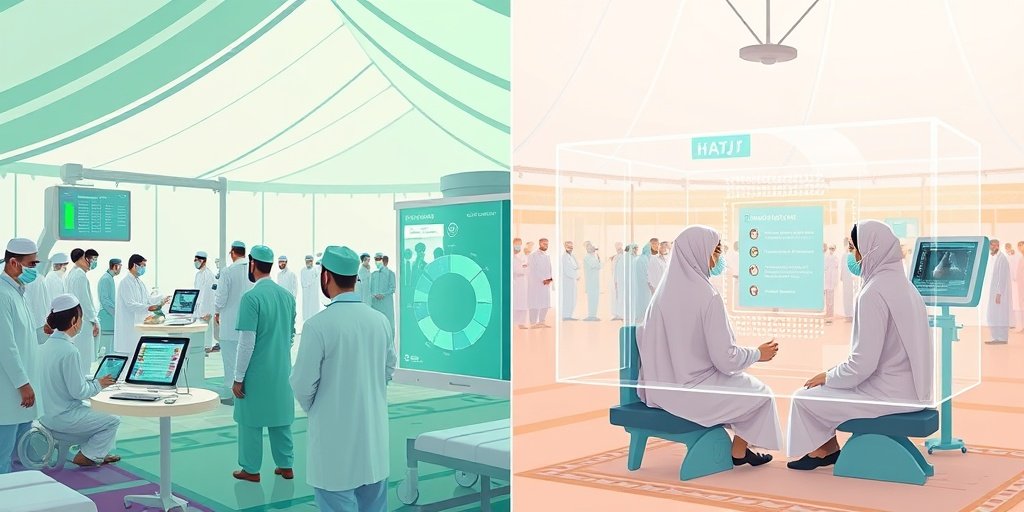⚡ Quick Summary
This study highlights the integration of Artificial Intelligence (AI) in enhancing healthcare services during the Hajj, a significant mass gathering. The task force identified key areas where AI can optimize patient care, operational management, and healthcare provider efficiency.
🔍 Key Details
- 📊 Focus Areas: Patient care, healthcare providers, operational management, healthcare systems
- 👥 Task Force Composition: Experts from healthcare, AI, and relevant Saudi societies
- 🗳️ Consensus Method: Voting system requiring over 80% agreement
- 📈 Future Initiatives: Ten guiding statements constructed by the task force
🔑 Key Takeaways
- 🤖 AI tools can enhance predictive analytics and triage during Hajj.
- 🏥 Medical imaging and care delivery can be improved through AI for healthcare providers.
- 📋 Operational management can benefit from AI in reducing administrative burdens.
- 🔍 Early detection and automation are crucial for healthcare systems during mass gatherings.
- 💡 Ethical concerns regarding AI and data security must be addressed.
- 📚 Additional research is needed to fill gaps in AI’s applicability in mass gathering healthcare.

📚 Background
The Hajj pilgrimage attracts millions of pilgrims, creating unique challenges for healthcare delivery. The complexity of managing healthcare during such mass gatherings necessitates innovative solutions. The integration of AI presents an opportunity to enhance healthcare services, ensuring that the needs of pilgrims are met efficiently and effectively.
🗒️ Study
A task force was established, comprising healthcare providers, AI specialists, and members from various Saudi societies. This collaborative effort aimed to explore the potential of AI in healthcare during Hajj. The task force utilized a structured framework and a voting system to reach consensus on key focus areas and future initiatives.
📈 Results
The task force identified four primary focus areas for AI integration: Patient Care, Healthcare Providers, Operational Management, and Healthcare Systems. Each area highlighted the potential for AI tools to improve healthcare delivery, enhance communication, and streamline operations, ultimately leading to better patient outcomes during Hajj.
🌍 Impact and Implications
The findings from this study underscore the transformative potential of AI in healthcare during mass gatherings. By optimizing healthcare outcomes and resource utilization, AI can significantly improve the quality of care provided to pilgrims. However, addressing ethical concerns and ensuring data security will be crucial as we move forward with these innovations.
🔮 Conclusion
The integration of AI in healthcare during mass gatherings like Hajj represents a significant advancement in clinical services. By focusing on key areas such as patient care and operational management, we can enhance the overall healthcare experience for millions of pilgrims. Continued research and dialogue are essential to navigate the challenges and maximize the benefits of AI in this context.
💬 Your comments
What are your thoughts on the role of AI in enhancing healthcare during mass gatherings? We would love to hear your insights! 💬 Join the conversation in the comments below or connect with us on social media:
AI-driven healthcare innovations for enhancing clinical services during mass gatherings (Hajj): task force insights and future directions.
Abstract
BACKGROUND: Due to the high complexity of healthcare during mass gatherings (MG), the integration of Artificial Intelligence (AI) might be crucial. AI can enhance healthcare delivery, improve patient care, optimize resources, and ensure efficient management of the large-scale healthcare demands during Hajj. This paper aims to provide an overview of AI utilization specifically during Hajj and explore the potential role of AI-driven tools in healthcare and clinical services provided to pilgrims.
METHODS: A task force was formed and included experts healthcare providers, AI specialists, and members from the Saudi Society for Multidisciplinary Research Development and Education (SCAPE Society), Saudi Critical Care Pharmacy Research (SCAPE) platform, Saudi Society of Clinical Pharmacy (SSCP), policymakers, and frontline healthcare practitioners involved in Hajj. The task force first agreed on the framework and voting system, then organized into teams to draft content for specific domains. Consensus was reached using a voting system requiring over 80% agreement, and all task force members reviewed and finalized the drafts. The selection of AI specialists, policymakers, and frontline healthcare practitioners for the task force was based on their expertise and relevance to healthcare during Hajj.
RESULTS: The task force identified key focus areas: (1) Patient Care: AI tools for predictive analytics, triage, resource management, and virtual healthcare. (2) Healthcare Providers: AI in medical imaging, care delivery, provider-patient communication, and training. (3) Operational Management: AI for healthcare documentation and reducing administrative burden. (4) Healthcare Systems: AI for early detection and automation during Hajj. The task force constructed ten statements to guide future initiatives.
CONCLUSION: Expanding the role of AI in healthcare during MGs will help optimize healthcare outcomes and utilization. Concerns about AI ethics and data security need to be addressed. Additional data is needed to address the gaps in the literature regarding AI’s applicability in healthcare services during MGs.
Author: [‘Alquayt A’, ‘Aljuhani O’, ‘Alharthi AF’, ‘Alqahtani R’, ‘Khan A’, ‘Al-Jedai A’, ‘Almoeen A’, ‘Alshennawi M’, ‘Badreldin HA’, ‘Aljouie A’, ‘Alnasser LA’, ‘Alshehri AM’, ‘Alzahrani MY’, ‘Alhaidal HA’, ‘Alhajaji R’, ‘Alotaibi S’, ‘Redhwan EZ’, ‘Alharthi F’, ‘Alghamdi BG’, ‘Al Sulaiman K’]
Journal: BMC Health Serv Res
Citation: Alquayt A, et al. AI-driven healthcare innovations for enhancing clinical services during mass gatherings (Hajj): task force insights and future directions. AI-driven healthcare innovations for enhancing clinical services during mass gatherings (Hajj): task force insights and future directions. 2025; 25:876. doi: 10.1186/s12913-025-13045-5